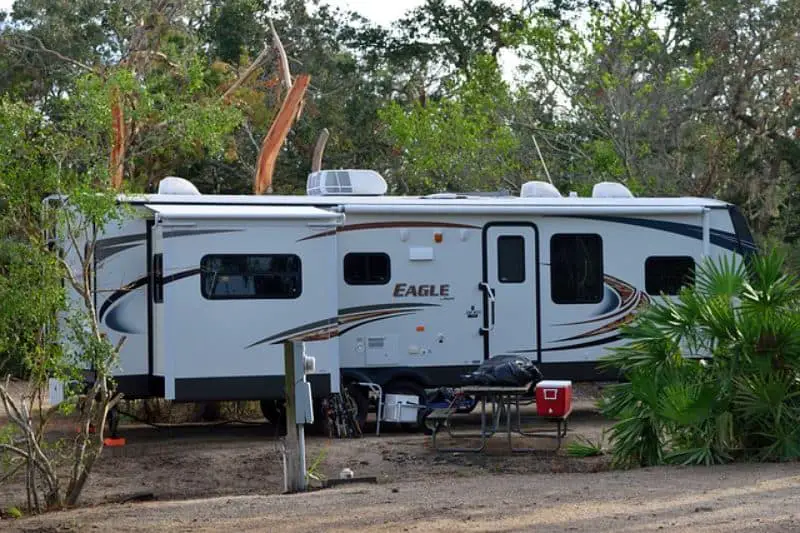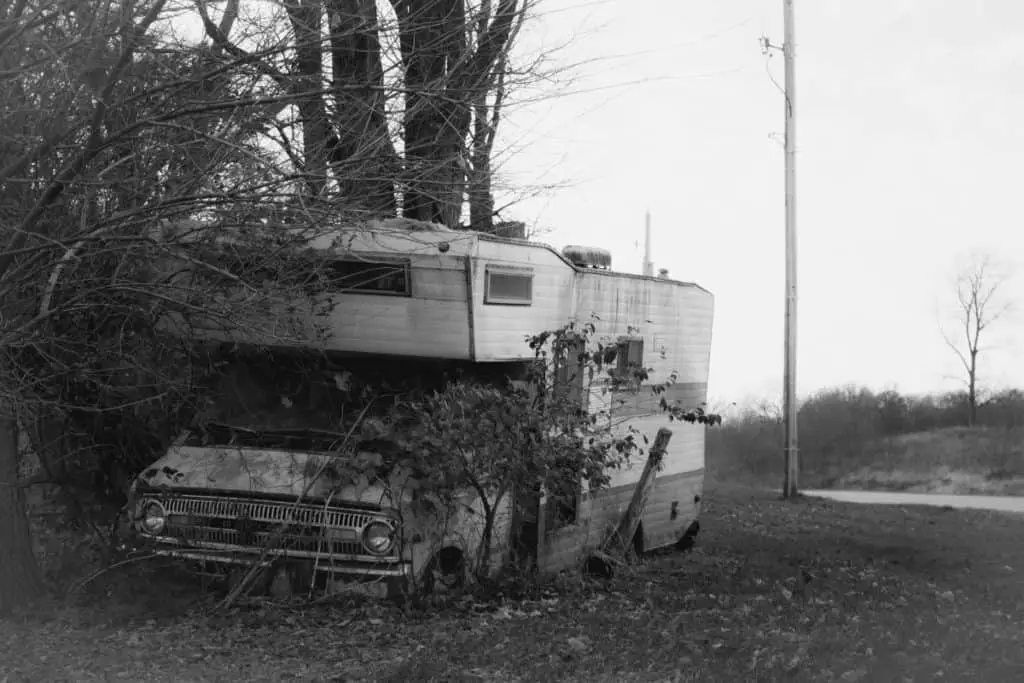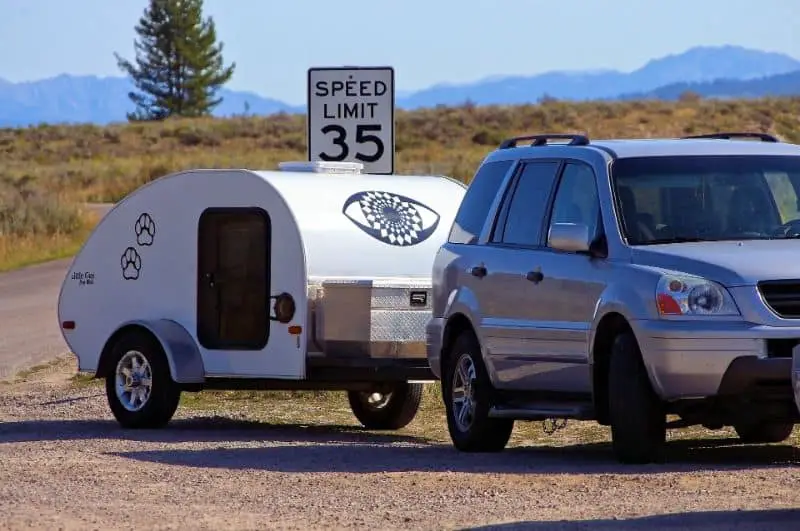Have you heard of the RV Park 10-Year Rule?
Here’s how the story goes: If your RV is older than 10 years, some RV parks may refuse your reservation.
You may have never experienced this rule, especially if you camp in temperate climates. Or if you hang out in the Midwest, Southeast, or Intermountain West.
If you have experienced the rule, chances are you absolutely despise it. And you’d like to hang the offending campground in effigy.
But there’s a complicated story to the 10-Year RV Rule.
And since it seems like it’s here to stay, let’s find out where this rule came from and whether it (actually) applies to you and Ol’ Bertha!
Table of Contents
What Is the RV 10-Year Rule?

Some RV parks and upscale campgrounds may refuse your reservation if your RV is 10 years old or older.
You don’t find the 10-year Rule at most mom n’ pop RV campgrounds. More common locations are upscale RV resorts and “snowbirding” campgrounds in Arizona, southern California, the Gulf Coast of Texas, and Florida.
A slightly less conservative rule is the 15-Year Rule.
Is the 10-Year Rule Legal?
Yes, the 10-Year Rule is legal. RV parks have the right to discriminate based on the condition or age of motor vehicle – just not on the basis of sex, gender, ethnicity, religion, etc.
Where Is the 10-Year Rule Enforced?
Currently, the 10-Year Rule is only found at privately owned campgrounds, not public options like state parks, national parks, BLM campgrounds, etc.
The 10-Year Rule isn’t some secret club, like the Five Guys secret burger menu.
- Most campgrounds will conspicuously post it on their websites and social
- media groups.
Others will mention the rule or ask for the age of your RV when you phone in your reservation.
But best to err on the safe side. If you own an older motorhome or camper, call ahead and ask! Be your own advocate.
Can My RV Be Turned Away?
Some RV parks have restrictions beyond the 10-Year Rule! Locales may not allow schoolies, bus conversions, non-RVIA certified rigs – heck, some don’t allow dogs, kids, or anyone younger than 55! Their land; their rules.
How Many Parks Enforce the 10-Year Rule?

According to a ToGo RV poll, it seems that 3-5 percent of RV parks have a strict 10-Year Rule. Other parks may have “old RV rules,” but are more than willing to make exceptions for maintained units.
But almost 80 percent of RV parks enforce some standard for RV condition, even if it’s not prominently cited or referenced at the time of reservation. Common “condition lists” include:
- Add-on window A/C units
- Duct tape/cardboard/plywood/tarps
- Broken windows, sagging doors
- Peeling decals
- Loose parts
- Signs of water leaks, delamination
- Severe body damage
Age isn’t the deciding factor – condition is.
Regardless of the age of your RV, ensure it’s in good condition. Pay particular attention to the exterior decals (and dents), the blackwater drain system, automotive fluids, and electrical hookups.
A good wax or clearcoat can shave 5 years off your rig!
Why Do RV Park Owners Use the 10-Year Rule?

RV parks use the 10-Year Rule for several reasons:
Weed Out Eyesore RVs
First impressions are powerful! And campgrounds don’t want to lose other customers who won’t appreciate your Cousin Eddie rig, even if it was the deal of a lifetime.
Campgrounds are afraid of the social media snowball effect. They don’t want to allow one ugly rig, have another customer write a scalding review, cement their reputation as a “low-class campground,” and lose future customers.
Reduce Mechanical Failures
RVs that break down in a campground are extremely difficult and expensive to remove! And with the only option for service being a mobile RV technician, getting repair isn’t much easier.
Plus, many park owners aren’t usually on-site. They rely on less-informed employees to handle reservations and check-in, and these customer service agents may not be educated enough to inspect all RVs.
RV parks want to avoid RVs with problems like these:
- Leaky wastewater tanks
- Tire blowouts
- Holes or delamination in the sidewalls
- Extensive frame rust
- Leaking automotive fluids
- Burnt out DOT-required safety lights
- Antiquated wiring
No campground owner wants to deal with blown breakers, oil leaks, sewage leaks (or worst-case scenario, an RV fire) from an old, poorly maintained RV.
Shield Against Squatters
There is a small group of unethical people who reserve a campsite and then refuse to pay. Or is unable to pay.
The RV park owner must file for eviction, which is an expensive legal process. And then the RV owner files for a Stop Eviction order due to financial hardship … you see how this goes. And at the end, the unscrupulous RV owner flees the coop, leaving the RV park to pay for hauling and scrapping.
No campground manager wants that. And therefore many RV parks have implemented the conservative, somewhat arbitrary 10-Year Rule.
Maintain Decorum
There are a few RV resorts that cater to a certain economic demographic. These resorts typically service Class A motorhomes costing $250,000 and up. They often don’t even allow towables, much less anything 10 years old!
As a customer, you can vote with your wallet. If you don’t wish to spend your time in an economically exclusive resort, don’t go there. FIDO: Forget It and Drive On!
The Rule sounds presumptuous, we know. There are thousands upon thousands of older RVs in great condition that should be allowed in any RV park!
But do try to walk a mile in the shoes of the RV park owner.
If you’ve traveled extensively, you’ve likely stayed at a “slum” campground: broken toilets, potholed roads, window air conditioners in duct-taped windows, weeds growing underneath tarped RVs that look older than the trees above them.
Park management doesn’t want that – and neither do you.
Do RV Parks Allow Exceptions to the 10-Year Rule?

Yes, almost all of them do!
But not because of wheedling or begging. RV parks may grant exemptions to RVs that have been meticulously maintained or restored.
- If you’re towing an Airstream that you’ve polished until it looks like quicksilver, you’ll likely be allowed in.
- If you’re driving ol’ Trusty Rusty, then even if “the motor’s never even hiccuped!”, you probably won’t be allowed in.
Usually, RV park owners are reasonable people. If you can show that your older RV is in good condition, most campgrounds will have no problems accommodating your request.
Most RV parks are much more lenient if you only plan on staying one night. If your RV can be considered an eyesore, then RV parks don’t want it dissuading other campers. But if you plan to pull in at 8:00 p.m. and be gone at 8:00 a.m., most RV parks will agree to a truce.
Sometimes, towables are more easily granted exemptions than motorhomes. That’s because a well-maintained towable has no definite end of life, while a motorhome with 200,000 miles will be showing unmistakable signs of age.
You will need to send pictures. Usually of the front, sides, and back. And don’t doctor them! More than one RVer has been turned away at the office because they Instagram-ified their rig mugshot.
What Do You Think About the RV 10-Year Rule?
Most RVers kinda-sorta loathe the 10-year RV rule.
- No one likes buying a $200,000 Class A coach with a 10-year expiration date.
- No one wants to be turned away because they aren’t “middle-class” enough.
- No one wants to be discriminated against for maintaining their RV into its old age.
- No one wants pristine vintage RVs to be arbitrarily banned.
The Rule can be ageist, in a way.
Most affected RVers just go find somewhere down the road to go camp.
(And more than a few RVers own perpetually 9-year-old rigs!)
Of course, we’re big fans of free camping and boondocking. And no one will ever ask how old your RV is out there!
Andy Herrick is a blogging nerd, #8 Enneagram, wannabe bread baker, INTJ, RV industry professional, and small business entrepreneur. He can be found hanging out with his lovely wife and family, skiing, cycling, climbing, hiking, and convincing anyone who will listen why dogs aren’t really that great of pets. Also, he runs this website.
-
Andyhttps://changingears.com/author/andrew-herrick/
-
Andyhttps://changingears.com/author/andrew-herrick/
-
Andyhttps://changingears.com/author/andrew-herrick/
-
Andyhttps://changingears.com/author/andrew-herrick/






